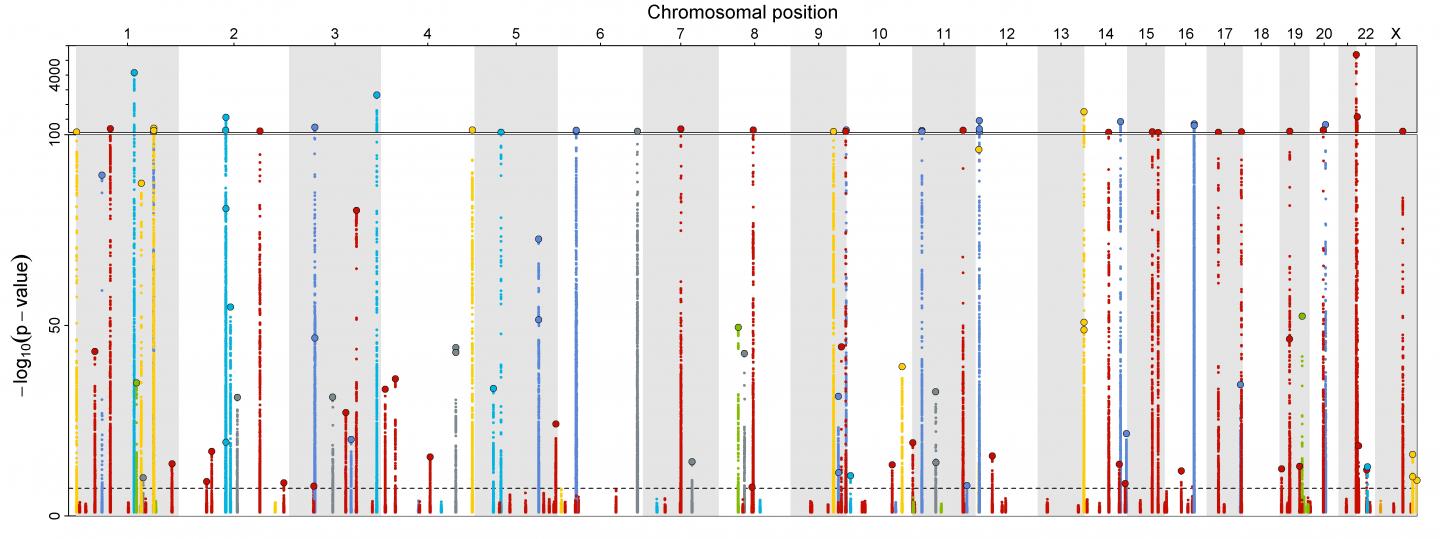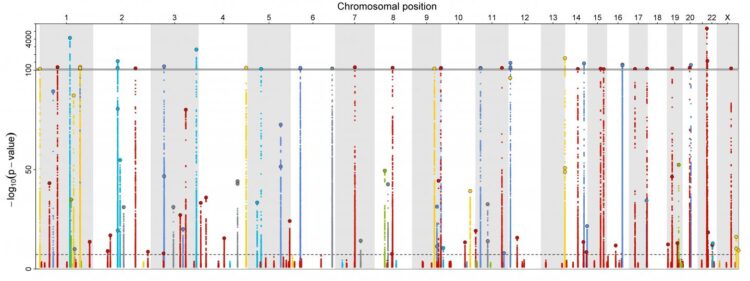Natural variation impacts virus-relevant proteins

Credit: Image: M. Pietzner
Like all viruses, the novel coronavirus is dependent on help from the human host cell. Proteins are the functional units of the cell and enable the virus to enter the host cell or help the virus to replicate. Scientists from Charité – Universitätsmedizin Berlin and from the Berlin Institute of Health (BIH), along with colleagues from the United Kingdom, Germany and the United States, have examined the corresponding genes of the helper proteins in a large study. They discovered numerous variants that influence the amount or function of the proteins as well as their ability to support the virus. The gene variants reveal potential target structures for new drugs. The researchers have now published their results in the journal Nature Communications*.
An infection of the novel coronavirus SARS-CoV-2, just like any other viral infection, follows a specific pattern: The viruses first bind to receptor proteins on the surface of the human host cells in the throat, nose or lungs before entering the cell, where they replicate with the help of the host cell machinery. The newly formed virus particles cause the infected cell to burst and infect other cells. As soon as the immune system notices what is happening, a defense mechanism is activated with the goal of destroying and removing both the viruses and virus-infected cells. Under normal circumstances, the infection is over within two weeks at the most. For all these processes, however, the virus is dependent on human or host proteins.
“In severe courses of COVID-19, this regulated process gets out of control and the immune system causes an excessive inflammatory response that attacks not only virus-infected cells but also healthy tissue,” says Prof. Dr. Claudia Langenberg, BIH Professor of Computational Medicine and head of the study now being published. “Naturally occurring variations in the genes that make up the blueprint for these human proteins can alter their concentration or function and may thus be responsible for the different course of the disease.” The team is well versed in the discovery of genetic variants that not only affect specific proteins but also common complex diseases. “As molecular epidemiologists, we study the diversity of genes – that is, the building instructions for proteins – of entire population groups in order to uncover susceptibilities to diseases whose cause lies in the interaction of many small deviations,” explains the epidemiologist, who joined the BIH from the Medical Research Council Epidemiology Unit at the University of Cambridge in September. “We wanted to use these experiences and data sets for the COVID-19 epidemic and make them available to the scientific community.”
“We examined 179 proteins known to be involved in SARS-CoV-2 infection for their naturally occurring variants,” reports Dr. Maik Pietzner, the study’s lead author and a scientist in Prof. Langenberg’s lab. “We were able to draw on findings which were based on samples of the first COVID-19 patients at Charité. ” This was possible due to close collaboration with the research group led by Professor Dr. Markus Ralser, Director of the Institute of Biochemistry at Charité, which had previously reported these findings. The team of Prof. Langenberg was able to use data from the MRC Fenland Cohort, a large population study that contains information from more than 10,000 individuals. They discovered 38 targets for existing drugs as well as evidence that certain proteins that interact with the virus influence the immune system. “Our findings also help to better understand risk factors for severe courses of COVID-19. We were able to show that blood coagulation proteins are influenced by the same genetic variant that increases the risk of contracting COVID-19 and that determines blood group 0,” reports Dr. Pietzner.
The team immediately made the results publicly available via an interactive webserver, which was developed with colleagues from Helmholtz Zentrum München (https:/
###
*Pietzner M et al. Genetic architecture of host proteins involved in SARS-CoV-2 infection. Nat Commun (2020), DOI: 10.1038/s41467-020-19996-z.
Media Contact
Prof. Dr. Claudia Langenberg
[email protected]
Original Source
https:/
Related Journal Article
http://dx.





